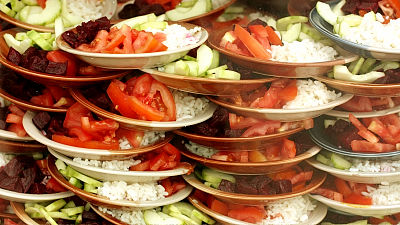Food transportation produces huge amounts of carbon dioxide

The amount of greenhouse gases emitted in a series of life cycles from the procurement of raw materials for goods and services to disposal and recycling is converted into CO2 and displayed, which is called the 'carbon footprint'. Comprehensive estimates of the food industry's carbon footprint have been released for the first time, producing far more CO2 emissions from food and food transportation than previously thought, nearly one-fifth of the total CO2 emissions of the food system. It became clear that it occupies.
Global food-miles account for nearly 20% of total food-systems emissions | Nature Food

Transporting food generates whopping amounts of carbon dioxide
https://doi.org/10.1038/d41586-022-01766-0
In the food life cycle, CO2 is emitted by agricultural land reclamation, livestock breeding, and food delivery to stores. The United Nations estimates that food cultivation, processing and packaging account for one-third of emissions in the life cycle. However, due to the complexity of food systems, it has been difficult to measure how much transportation directly leads to CO2 emissions into the atmosphere.
According to Monyu Lee, a 'sustainability' researcher at the University of Sydney, Australia, many studies to date have been, for example, 'how much CO2 is produced by bringing a chocolate bar to a store?' The focus is on CO2 emissions from planes, ships and trucks that transport all the ingredients needed to make chocolate bars in the first place, and have been underestimated.
Lee and his colleagues collected regional data for 74 countries to track where food came from, where it went, and how it moved next. As a result, it was found that the amount of CO2 emitted during standby by food transportation in 2017 was equivalent to 3 gigatons, which is 7.5 times the previous estimate.
In particular, wealthy countries, which make up about 12% of the world's population, generate almost half of the CO2 emissions of international food transport, while low-income countries, which make up half of the world's population, produce only a small amount of CO2 emissions. It was 20%.
In addition, refrigeration is required to transport fruits and vegetables freshly, but the amount of CO2 emissions when refrigerated transportation is double that of CO2 produced by growing fruits and vegetables.
Sustainability researcher Nina Domingo of Yale University said that a plant-based diet is better for the environment than eating lean meat because livestock require a lot of land and emit a lot of CO2. Pointed out that has been shown in numerous studies. This paper does not mean that 'the amount of fruits and vegetables in the diet should be limited', but that vegetables and fruits should be 'locally produced for local consumption' as much as possible while reducing the consumption of lean meat. Said that it may help mitigate the impact on the climate.
Related Posts:
in Food, Posted by logc_nt







